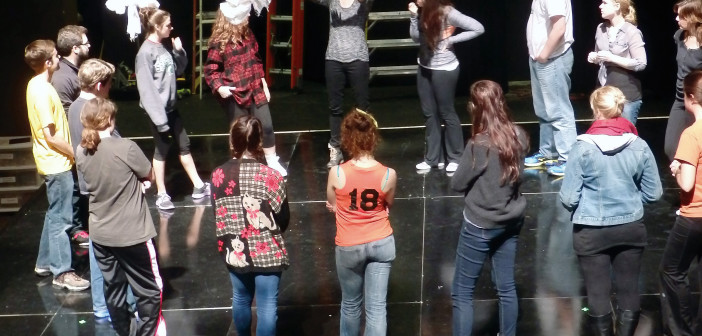Corinne Wittig
Staff Writer
The lights dim and an audience’s chatter slowly dwindles down. Soon thereafter, the stage curtains lift and they reveal a set that invites you into the “world” of the production. Following in suit and at just the right moment, is a fully costumed actor or actress projecting their very well-rehearsed opening lines.
As a member of the audience, it can be easy to become totally submerged in the effortless beauty of a theatrical performance. With that being said, it is also easy to forget what goes on not behind the curtains, but backstage.
Before the show:
In order to create a stage, a lot of time has to be spent not just during the show, but in preparing for the show as well. Take dramaturgy for example. Members who take on this role must research information about the play to guarantee that it will be presented in the most accurate manner. Jesek West, a senior explains, “For example, the dramaturge for Parade this fall will research the murder of Mary Phagan thoroughly and then present the cast and crew with the educational information that they need to know”.
Set design and light design requires research and pre planning for a production as well. Before anything involving these elements can be solidified, the appointed set and light designers present their research and ideas for the show in a meeting with the rest of the production crew. Almost always, these designers come with various visual representations of what they hope to incorporate into the up and coming production.
The preparation does not stop there. Props need to be discussed, and then rented or purchased; Hair and make-up needs to be planned and costumes need to be researched and rented or purchased too.
Interestingly enough, each year the theater department gives students a chance to direct a production of their choice and of course, with that requires an extreme amount of planning months before opening night.
“It is unbelievable all the work that goes into one set, and when we walk into the theater the next day, it is completely gone” -Amanda Peck, 15′
Senior and student director, Erik Burke has been planning and preparing for his show True West, since last spring term. “It starts with a selection process, every winter term the department sends out an email for the student directed series and you have to write a proposal that is typically five pages stating why you want to put on this play, how would you would direct this play, how you would put it on, and then how would you do it within the given budget. Then in spring term, the department chooses the best three proposals”.
Even with that much preparation, for this student director, pre-show is where a bulk of his work takes place. “You’ve got to get your designers together, you have to cast the show, you have to rehearse, and you have to work with the actors, then you have to make sure the set gets done, the lights and the sounds etc. And then the big thing that happens in the theater world is tech week, which happens right before the show opens and that too is where I think a lot of the work comes in”, says Burke.
During the show:
Stage Management is the part of the production crew that holds everything in a live performance together. Within stage management there are several different departments that help keep the show moving.
First and foremost, there is the stage manager. Jesek West plays dual roles in the theater department. Aside from acting, she is the most familiar with the position of stage manager. West says, “Many theatre participants will tell you that a stage manager is the most vital component to any process”. In short, the individual assigned this positon essentially oversees the rest of the stage management department and ensures things behind the stage are running seamlessly for everyone involved.
Next, there is the run crew. These individuals also are a part of producing a one of a kind show and in charge of technical things such as lighting and sound effects. For this position, it is crucial to always be alert and attentive as well as flexible too.
After the show:
As the show concludes, there is still work to be done. During a “strike”, actors and crew members come together to dismantle the set and clean the theater. Amanda Peck, a senior involved in the theater department says, “It is unbelievable all of the work that goes into one set, and when we walk into the theater the next day it is completely gone”.
As one can see, preparing for a show is no easy task. It takes a lot of time, effort, and commitment. “Specifically behind the scenes, spring term of last year I was serving as an assistant stage manager and assistant director on Erlkoning, and was easily putting in 40 hours per week minimum all term long. Especially during the tech week before the show, it is common to be in the theatre from 4pm-2am”, says West.
Just like any other team, the cast or crew, the members of a production have to work cohesively to create success.
For more information about the department or productions, visit http://finearts.northcentralcollege.edu/theatre

